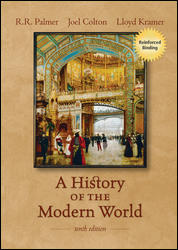
History of the Modern World, 10th Edition (Palmer)Chapter 2: The Upheaval in Western Christendom, 1300-1560Chapter OverviewLatin Christendom underwent a series of crises and disasters beginning in the thirteenth century that would accelerate the long process of secularization. The plague triggered social revolt, to which rulers and the nobility responded violently. The crisis in papal authority in the fourteenth century encouraged the rise of sects and calls for reform. By the sixteenth century, criticisms of Catholic practices and the corruption of the church culminated in the emergence of Protestantism. Catholics responded to the spread of Protestantism with a renewed commitment to missionary activities. Both Catholicism and Protestantism sought to enforce religious conformity, often through the state. Meanwhile, the cultural contributions of the Renaissance had transformed the arts, literature, and conceptions of the human experience, politics, and religion. The Italians paved the way for a more secular outlook on life, while the northern Renaissance thinkers grappled with Christianity and the challenge of restoring its vitality. National monarchs sought to control all aspects of government within their domains, including religion, reinforcing the reality of religious divisions among European societies. |  |















